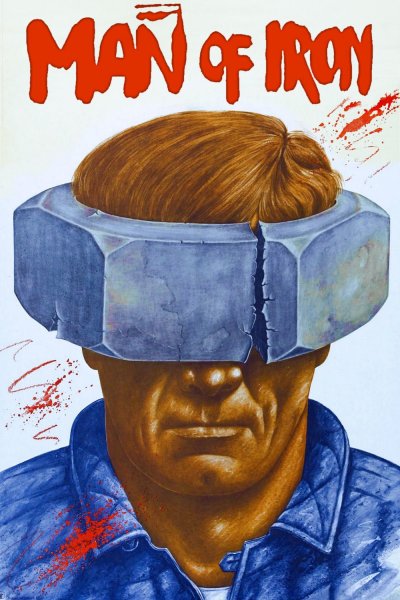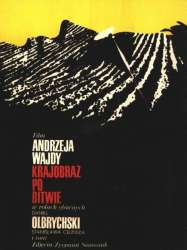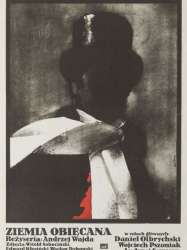Man of Iron is a polonais film of genre Drama directed by Andrzej Wajda released in USA on 27 july 1981 with Jerzy Radziwiłowicz
Man of Iron (1981)
Człowiek z żelaza

If you like this film, let us know!
Man of Iron (Polish: Człowiek z żelaza) is a 1981 film directed by Andrzej Wajda. It depicts the Solidarity labour movement and its first success in persuading the Polish government to recognize the workers' right to an independent union.
The film continues the story of Maciej Tomczyk, the son of Mateusz Birkut, the protagonist of Wajda's earlier film, Man of Marble. Here, Maciej is a young worker involved in the anti-Communist labour movement, described as "the man who started the Gdańsk Shipyard strike", and a journalist working for the Communist regime's radio station, who is given a task of slandering Maciej.
[...]See more...
Synopsis
The film is set in Gdansk in 1980. In Gdansk shipyard workers strike continues. Among them, an important role is played by activist Strike Committee, Maciek Tomczyk (played by Jerzy Radziwiłowicz). Radio journalist, editor Winkel (Marian Opania) is ordered by the deputy chairman of Radio Committee (Janusz Gajos) to achieve coverage compromising Tomczyk. Is sent to Gdansk, where a representative of the authorities Badecki (Franciszek Trzeciak) realizes the importance of his job.Actors

Jerzy Radziwiłowicz
(Maciek Tomczyk / Mateusz Birkut)

Krystyna Janda
(Agnieszka)

Bogusław Linda
(Dzidek)

Artur Barciś
(student)

Marian Opania
(Winkel)
Trailer of Man of Iron
Bluray, DVD
Streaming / VOD
Comments
Leave comment :
Suggestions of similar film to Man of Iron
There are 75 films with the same actors, 38 films with the same director, 62841 with the same cinematographic genres (including 4061 with exactly the same 2 genres than Man of Iron), 8403 films with the same themes (including 140 films with the same 2 themes than Man of Iron), to have finally 70 suggestions of similar films.If you liked Man of Iron, you will probably like those similar films :

Full Metal Jacket (1987)
, 1h56Directed by Stanley Kubrick
Origin USA
Genres Drama, War, Historical
Themes Politique, Films about the labor movement, Political films, United States Armed Forces in films, Harcèlement au travail
Actors Adam Baldwin, Matthew Modine, Vincent D'Onofrio, R. Lee Ermey, Arliss Howard, Dorian Harewood
Rating81%





In 1967, during the Vietnam War, a group of new U.S. Marine Corps recruits arrive at Parris Island, South Carolina, for basic training. After having their heads shaved, they meet Senior Drill Instructor Gunnery Sergeant Hartman, who employs excessively aggressive tactics to turn the recruits into hardened, combat-ready Marines. Among the recruits are privates "Joker", "Cowboy", and the overweight, bumbling Leonard Lawrence, who earns the nickname "Gomer Pyle" after attracting Hartman's wrath.

Native Land (1942)
, 1h20Directed by Paul Strand
Origin USA
Genres Drama, Documentary, Historical
Themes Politique, Films about the labor movement, Documentary films about politics, Political films
Actors Paul Robeson, Robert Strauss, Houseley Stevenson, Howard Da Silva, Art Smith, John Marley
Rating62%





Face aux violences de la police et des milices privées au service du patronat, dans l'Amérique des années 1930, des travailleurs luttent, parfois au péril de leur vie, afin de préserver les libertés civiques.

Walesa: Man of Hope (2013)
Directed by Andrzej Wajda
Origin Pologne
Genres Drama, Biography, Historical
Actors Robert Więckiewicz, Agnieszka Grochowska, Zbigniew Zamachowski, Maria Rosaria Omaggio, Mirosław Baka, Cezary Kosiński
Rating64%





Wałęsa, an electrician at the Gdańsk Shipyards, participated in local demonstrations during the 1970s. Following the bloody aftermath, which remains with Wałęsa, he concentrates on his day-to-day duties. Ten years later, a new uprising occurs and he becomes an unexpected and charismatic leader of Polish dockworkers.

Landscape After Battle (1970)
, 1h41Directed by Andrzej Wajda
Origin Pologne
Genres Drama, War, Historical, Romance
Actors Daniel Olbrychski, Aleksander Bardini, Stanisława Celińska, Tadeusz Janczar, Zygmunt Malanowicz, Mieczysław Stoor
Rating69%





The Landscape After the Battle film tells a story of two young concentration camp survivors. A young Polish poet (Tadeusz) is asked by a pretty Jewish girl (Nina) to go with her to the West. His camp experience, however, prevents him from realizing the depth of her love for him, and he is reluctant to commit. The woman is accidentally shot dead by an American soldier, causing the poet to cry for the first time in years. The shock of her death brings back the world of feelings suppressed by his Nazi captors, and allows for his original creativity to reemerge.

Salt of the Earth (1954)
, 1h34Directed by Herbert J. Biberman
Origin USA
Genres Drama, Historical
Themes Feminist films, Politique, Films about the labor movement, Political films
Actors Rosaura Revueltas, Will Geer, David Bauer, David Wolfe
Rating73%





The film opens with a narration from Esperanza Quintero (Rosaura Revueltas):

The Promised Land (1975)
, 2h59Directed by Andrzej Wajda
Origin Pologne
Genres Drama, Historical
Actors Daniel Olbrychski, Wojciech Pszoniak, Andrzej Seweryn, Anna Nehrebecka, Kalina Jędrusik, Franciszek Pieczka
Rating77%





Karol Borowiecki (Daniel Olbrychski), a young Polish nobleman, is the managing engineer at the Bucholz textile factory. He is ruthless in his career pursuits and unconcerned with the long tradition of his, now financially declined, family. He plans to set up his own factory with the help of his friends Max Baum (Andrzej Seweryn), a German and heir to an old handloom factory, and Moritz Welt (Wojciech Pszoniak), an independent Jewish businessman. Borowiecki's affair with Lucy Zucker (Kalina Jędrusik), wife of another textile magnate, gives him advance notice of a change in cotton tariffs and helps Welt to make a killing on the Hamburg futures market.
[...]See more...

The Ashes (1965)
, 3h54Directed by Andrzej Wajda, Andrzej Żuławski
Origin Pologne
Genres Drama, War, Historical
Actors Daniel Olbrychski, Beata Tyszkiewicz, Pola Raksa, Władysław Hańcza, Jan Koecher, Zbigniew Sawan
Rating70%





Le film se déroule pendant les guerres napoléoniennes.

How Green Was My Valley (1941)
, 1h58Directed by John Ford
Origin USA
Genres Drama, Historical, Romance
Themes Films about families, Films about the labor movement, Political films, Children's films
Actors Walter Pidgeon, Irving Pichel, Maureen O'Hara, Anna Lee, Donald Crisp, Roddy McDowall
Rating76%





The film opens with a monologue by an older Huw Morgan (voice by Irving Pichel): "I am packing my belongings in the shawl my mother used to wear when she went to the market. And I'm going from my valley. And this time, I shall never return." The valley and its villages are now blackened by the coal mines that fill the area.

Gates to Paradise (1968)
, 1h29Directed by Andrzej Wajda
Origin Pologne
Genres Drama, Historical
Themes Films about sexuality, LGBT-related films, LGBT-related films, LGBT-related film
Actors Lionel Stander, Mathieu Carrière, Jenny Agutter, Ferdy Mayne, Kynaston Reeves, Janez Vrhovec
Rating61%





Vers 1210, un jeune berger, Jacques de Cloys prêche une nouvelle croisade. Des centaines de jeunes gens quittent leurs villages en entendant l’appel et partent sur les routes pour libérer le tombeau du Christ. Un moine, compagnon de route, entend en confession certain des enfants au long du voyage.

Forbidden Games (1952)
, 1h26Directed by René Clément
Origin France
Genres Drama, War, Historical
Themes French war films, Films about children, L'enfance marginalisée, Political films, Histoire de France, L'Occupation allemande en France
Actors Georges Poujouly, Brigitte Fossey, Laurence Badie, Jacques Marin, Madeleine Barbulée, Suzanne Courtal
Rating79%





It is June 1940, during the Battle of France. After five-year-old Paulette's parents and pet dog die in a German air attack on a column of refugees fleeing Paris, the traumatized child meets 10-year-old Michel Dollé whose peasant family takes her in. She quickly becomes attached to Michel. The two attempt to cope with the death and destruction that surrounds them by secretly building a small cemetery among the ruins of an abandoned watermill, where they bury her dog and start to bury other animals, marking their graves with crosses stolen from a local graveyard, including one belonging to Michel's brother.
[...]See more...
 Connection
Connection